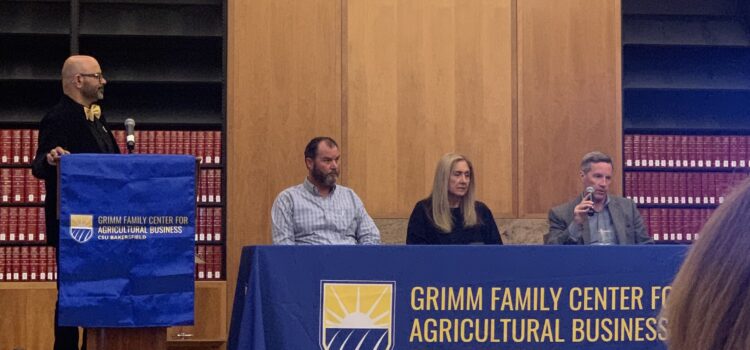
The Grimm Family Center for Agricultural Business (GFCAB) has started its Speaker Series at CSUB throughout the spring semester. On February 28, GFCAB hosted a panel with Deputy Director for California Department of Water Resources, Paul Gosselin, to discuss the Sustainable Groundwater Management Act (SGMA).
The structure of the Sustainable Development and Management Act is fairly unique to state law, according to Gosselin. California is 10 years into implementation of the Act which passed in 2014 and it is a twenty-year implementation horizon to reach sustainability.
The Groundwater Sustainability Agency carries out the local program and provides assistance, regulatory guidance, and oversight. If any of those triggers or deadlines weren’t met, the State Water Resources Control Board would come in and start to take away local control until issues are resolved and to bring it back, Gosselin explained.
“The law really placed a high bar on community participation as part of this because the water decisions are going to be the community values about where they want the community to go,” he said.
According to Gosselin, one of the things that was difficult in developing the Act was trying to define what sustainability is and what they wanted to avoid. He referred to this as the “six deadly sins of poor groundwater management.” Which is lowering groundwater levels, reduction of storage, subsidence (the sinking of land), water quality, seawater intrusion and interconnected (depletion of interconnected streams and creeks.)
“All those things need to be looked at through the lens of how the basin’s managed,” he said.
Gosselin explained the plans include where the basin is, and a lot of administrative information but also a lot of technical scientific information.
“These plans are well over a thousand pages with data analysis, modeling tools, where the basin is, understanding how the groundwater conditions are, doing projections out to the future, incorporating growth, climate change, and looking at where the basin is going to be 50 years out,” Gosselin stated.
There are 71 basins that are approved and are reviewed consistently every five years, Gosselin explained.
“No plan’s going to look the same way when we approve it to what it’s going to look like in 2014 and 2032… So when we approve basins, we also talk about these corrective actions we want them to take care of, but it’s something we work through over time. We do have 13 basins now that are deemed incomplete. And what that means is when we do the initial review of the plans. We may find a deficiency or a problem in a plan that could lose our approval,” he said.
The 13 incomplete basins are Big Valley, Bed Bluff, Corning, Colusa, Antelope, Los Molinos, Modesto, Turlock, Tulelake, Butte Valley, Fillmore, Piru, and Pleasant Valley.
“It’s kind of pretty significant. It’s something we don’t want to wait for the five year periodic update. We need to resolve them now,” Gosselin stated.